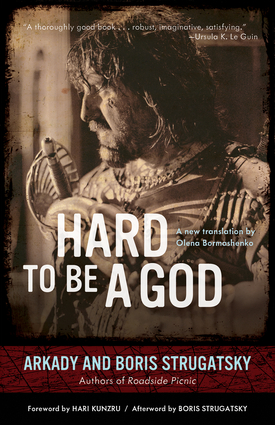
I’ve been slowly working my way through the works of Russian science fiction novelists Arkady and Boris Strugatsky–following Definitely Maybe and Roadside Picnic, I checked out Hard to Be a God (in part because I’d been reading about a recent film adaptation of it). It’s a deeply strange book, in the best way: though set in a world that resembled medieval Europe, it’s also a work of science fiction. The protagonist hails from a future Earth, and while he’s a participant in this society, he’s also forbidden from taking any action that might affect it on a substantial level, from killing to advancing the local technology.
Essentially, the Strugatskys are able to get the best of both worlds: there’s plenty of palace intrigue, but also a legitimate and very science fictional dilemma. And, through the protagonist’s romance with a woman from this society, there’s also a noir-like quality to aspects of it: the star-crossed lovers, and the deep-cover agent in over his head.
I picked up Patrick Modiano’s Suspended Sentences a few weeks ago; I’ve been reading a bit about him since his Nobel win, and I’d heard that this collection of three novellas was a good place to start. As someone who’s an admirer of fiction that traffics in ambiguity and dips its toes into the noir-influenced (think Javier Marias’s Your Face Tomorrow; think Emily St. John Mandel’s first three novels; think early Auster), this clicked with me in a lot of ways. Narrators who don’t quite see the whole picture; plots that are haunted by the atrocities of the past; the hints of something ominous below the surface–all of those are right here. This is the first book of Modiano’s I’ve read, but it certainly won’t be the last.
Speaking of the Nobel Prize: a few friends noted that Ngugi wa Thiong’o is an author who really should be in contention for said award. I vowed to read more from him, and opted for Petals of Blood, which begins with a crime (the killing of three officers of a brewery) and then jumps back in time, examining the histories of the four people under suspicion for it. Over the course of the book, what emerges is the history of a community and the history of a nation, and the compromises and sacrifices made by all of the central characters. It’s a bleak, epic, and ultimately wrenching novel.
From international fiction, I took a detour into talk of international sports and politics. James Montague’s Thirty One Nil looks at the early days of qualification for the 2014 World Cup; the stories he tells focus on everything from the journey of American Samoa’s team from abysmal beginnings to Bob Bradley’s stint as coach of the Egyptian national team to the internal politics of the Eritrean national team. Montague is able to find compelling narratives for almost all of the teams that he covers, and also answers some interesting questions about FIFA along the way, including explaining why FIFA President Sepp Blatter is popular in certain circles.
Follow Vol. 1 Brooklyn on Twitter, Facebook, Google +, our Tumblr, and sign up for our mailing list.
